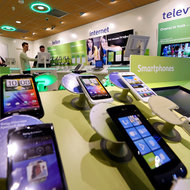But whether EE, a joint venture of Deutsche Telekom and France Télécom, will succeed by marketing fiat alone in killing off access to unlimited wireless data in Britain remains to be seen.
The country’s mobile market is one of the most competitive in Europe, with four network operators, as well as resellers like Virgin Mobile and Tesco Mobile.
With the switch in network technologies from the decade-old 3G service to LTE, or Long Term Evolution, EE raised the price of subscribing to wireless broadband about £5, or $7.60. That increase was on packages starting at £41 a month for a service the company said was five times as fast as 3G. (LTE, a so-called fourth-generation technology, is a computer-based method of sending data, eliminating the mechanical bottlenecks of older grids.)
One in four EE customers in the new network’s coverage area have subscribed to the LTE service since Oct. 30, Olaf Swantee, the chief executive of EE, which stands for Everything Everywhere, said during a recent interview. In the United States, LTE is much more expensive, he noted, approaching or exceeding $100 a month.
U.S. companies usually charge more, but also tend to give consumers the option of sharing the data allotment on multiple devices. Verizon Wireless, the U.S. market leader, offers unlimited voice and text plus 2 gigabytes of monthly downloads on any device for $100.
The LTE packages from EE, most of which also include unlimited voice and texts, cost as little as £41 for 3 gigabytes of data downloads a month with a two-year contract.
“We have the most attractive 4G pricing in the world in the U.K.,” Mr. Swantee said on the sidelines of the Mobile World Congress in Barcelona.
But the decision by EE, the biggest mobile operator in Britain, to phase out unlimited packages has drawn blunt criticism. The online journal Endgadget said British customers would have to “sign away a kidney” for the company’s LTE plans.
Reading the public mood has been difficult, and most of EE’s competitors seem unsure whether Britons, already coping with a government austerity plan, are ready to embrace new limits on mobile surfing as well.
The second- and third-largest operators in Britain, O2 and Vodafone, declined to say how they would sell LTE when they started service. Simon Lloyd, a spokesman for O2, said by e-mail that his company, owned by Telefónica of Spain, would commence LTE service in the summer.
“It is too early at this stage to talk about our pricing, but the plan is to ensure that as many people as possible can enjoy 4G,” Mr. Lloyd said. “Pricing will be competitive — certainly not prohibitive.”
A Vodafone spokesman, Richard Wray, said by e-mail that the company would turn on its LTE network by June 21 and would publish details on pricing closer to the debut. Vodafone is the largest mobile operator in Europe by market value and sales.
With consumer reaction uncertain, even EE appears to be keeping its options open, continuing to sell some unlimited 3G plans through its T-Mobile and Orange brands.
James Barford, an analyst with Enders Analysis, a research firm in London, said he expected O2 and Vodafone to follow EE and sell 4G data in distinct chunks, increasing the momentum to price wireless data in new download dosages. Mr. Barford said he would not be surprised if EE had phased out its remaining unlimited 3G plans by next year.
Mobile operators simply cannot afford to give consumers free unlimited access to wireless data at any speed in an industry where revenue fell 4 percent last year in Britain and was down 6 percent on average across Europe, Mr. Barford said.
Article source: http://www.nytimes.com/2013/03/18/technology/trying-to-wean-britons-from-unlimited-mobile-data.html?partner=rss&emc=rss


